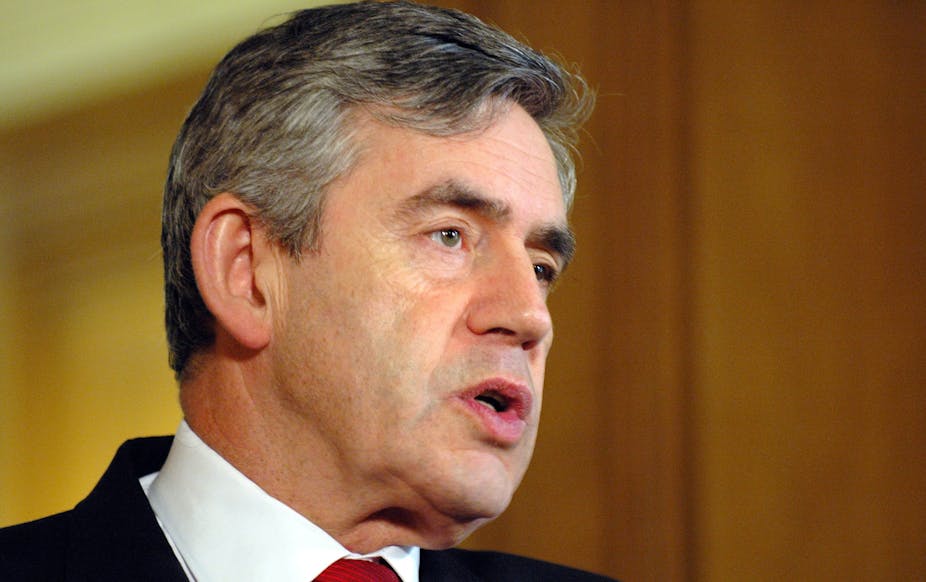Gordon Brown will retire from the Commons viewed on the one hand as a giant of Scottish Labour who spent 13 years at the pinnacle of frontline UK politics as chancellor and prime minister: the son of the clergy who stayed true to his roots; champion of the egalitarian tradition. Yet to his detractors, he was the Labour chancellor primarily responsible for overseeing the City of London’s financial recklessness that brought the UK economy to its knees and resulted in the austere times in which we now live.
Whatever your view of Brown, we must acknowledge that in the past two decades he is probably the only politician who can claim to have consistently been there when key decisions that have shaped the landscape of UK politics have been made. The “Brown effect” has been very visible throughout.
In 1994 he made the decision to step aside and allow Tony Blair a free run at the leadership in that infamous meet in the Granita restaurant. For a decade as chancellor he dominated the UK domestic policy agenda. For three years he then served as prime minister. Even after the 2010 general election it looked possible for a brief period that he may seize victory from defeat with a coalition deal with the Liberal Democrats.

This year’s Scottish referendum campaign then saw his resurrection as possibly the most effective defender of the union. Late in the campaign, amid polls showing a potential Yes vote for Scottish independence and panic among the Westminster political class, it was he who got each of the main UK parties to sign up to the now infamous “Vow” promising further devolution.
It is no exaggeration to say that the current agenda of devolved politics in the UK has effectively been set by Gordon Brown, even as a mere opposition backbencher. Between 1994 and 2014 he can lay claim to have been UK’s most consistently influential politician.
Yet there is something of a “what if?” about Gordon Brown’s career in politics too. What if he had chosen to contest the Labour leadership election in 1994? What if he had called a snap general election in late 2007 when the Labour party was promoting his PM credentials with a Saatchi & Saatchi advert designed to capture his strength, solidity and conviction: “Not Flash, Just Gordon”?

Even as he bows out the question is increasingly being asked, what if the Smith Commission delivers a devolution settlement that the Scottish electorate does not view as consistent with the Brown-inspired “Vow”? Does that mean that by stepping down he is reneging on his promise to see it delivered?
Brown is lauded by Scottish Labour, though it is a party that – as the writer Gerry Hassan has pointed out – tends to view itself with some romance. Positive assessments would point to his perceived strong handling of the global financial meltdown. The economist Paul Krugman wrote in 2008, for instance, that Brown (and his chancellor Alistair Darling) “defined the character of the worldwide financial rescue effort.”
Supporters would argue that in his decade as chancellor, he consistently sought to incrementally improve the lot of the working poor. There is certainly substantial evidence of falling poverty during his era in government. The irony today, of course, is that many of the gains of that era have unravelled as child poverty has started to move in the wrong direction again.
Relative poverty rates 1996-2010

A more negative assessment is likely to contain reference to character flaws that inhibited his leadership credentials, his weak regulation of the City, the sell-off of the nation’s gold reserves at the bottom of the market, and of course his electoral defeat in 2010. “Flawed, failed, finished” was the Telegraph’s conclusion at the time.
In the space of three years he went from being lauded as the UK’s most successful chancellor of the exchequer who had declared the “end of boom and bust” and “the beginning of a new Golden Age” to presiding over a country in a debilitating credit crunch amid Labour in-fighting, a breakdown in relations with many colleagues including his chancellor, and ultimately a failure to dissuade the electorate against the Tory/Lib Dem mantra that Labour allowed it all to go wrong.

In sum, there is no credible argument against Gordon Brown having been a giant of UK frontline politics. There is a considerable one over his legacy, however. Undoubtedly Brown did “make a difference” in some ways. But the sense of missed opportunity and ultimate failure will always hang over what he achieved.

